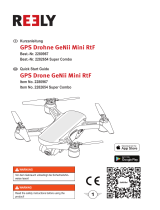
23961
English
IMPORTANT FEATURES
Hexacopter:
•6 propellers on 6 motors for smooth
flight and complex manoeuvres
•Loopingfunction
(forexperiencedpilotsonly!)
•Rechargeablelithiumbattery
•Forindoorsandoutdoors
•Pleasekeepthisoperatingmanual
safe for later use.
•Theusershouldonlyoperatethis
multicopter in accordance with the
instructions for use in this operating
manual.
•Donotflythemulticopternear
people, animals, bodies of water or
power lines.
•ThechargerfortheLiPobatteryis
specially designed for the charging of
the multicopter battery. The charger
may only be used to charge the
multicopter battery, not other
batteries.
•Neverallowthemulticoptertocome
into contact with water, because the
electronics can be damaged as a
result.
•Alwayswatchtheaircrafttoensureit
does not fly into and injure the pilot,
other people or animals.
•Ingeneral,itmustbeensuredthat
the model cannot injure anyone in
consideration of potential malfunc-
tions and defects.
•Thismulticopterisnotsuitablefor
people with physical or mental
limitations.Werecommendthat
persons who are unfamiliar with
model multicopters commission
the vehicle under the instruction of
an experienced pilot.
•Themulticopterrangeisabout50
metres. Therefore, the aircraft may
never be more than 50 metres away
from the pilot.
Safety instructions:
•Thishelicopterissuitableforpilots
whoareatleast8yearsofage.Adult
supervision is required when flying it.
•Warning! Not suitable for children
under 36 month. Small parts. Choking
hazard! Used under the direct super-
vision of an adult! The packaging must
be saved, because it contains important
information. Changes to the colour and
technical modifications reserved.
•Duetoitsdesign,thismulticopter
achieves extremely high flying speeds
and needs time to slow down again!
Plan your flight accordingly!
•Thismanualmustbereadandunder-
stood in its entirety prior to operating
the helicopter!
•Thismulticopterissuitableforuse
indoors and as well as outdoors when
there is no wind. Flying in wind is only
recommended for experienced pilots!
•Keepyourhands,face,hairandloose
clothing away from the rotors.
•Switchofftheremotecontroland
multicopter when they are not in use.
•Removethebatteriesfromtheremote
control when it is not in use.
•Alwaysmaintainvisualcontactwith
the multicopter in order to avoid losing
control of it.
•Werecommendnewalkalimanganese
batteries for the remote control. Single
use batteries for this remote control can
be replaced with environmentally-
friendly rechargeable batteries.
•Assoonastheremotecontrolno
longer functions reliably, new
batteries should be inserted.
•Neverdisassembleoralterthebattery
contacts. Do not damage or puncture
the battery cells. There is a risk of
explosion!
•TheLiPobatterymustbekeptoutof
reach of children.
•Whendisposingofbatteries,theymust
be discharged or their capacity must be
fully depleted. Cover exposed terminals
with adhesive tape in order to prevent
short-circuiting!
Safety instructions:
•Theproductmayneverbestructurally
modified. This may lead to it becoming
damaged or posing a danger.
•Avoidtheriskofdangerbynever
operating the aircraft while sitting on
the ground or in a chair. Operate the
aircraft from a position that allows easy
evasion if needed.
•Alwaysswitchofftheaircraftandthe
remote control after use. Otherwise,
it is possible for the model to be
unintentionally started.
Required batteries for the
multicopter:
Power supply:
Ratedoutput:DC7.4V/4.81Wh
Batteries: 1 x 7.4 V rechargeable
LiPobattery(interchangeable)
Capacity: 1600 mAh
Battery requirement for the
remote control:
Power supply:
DC 9 V
Batteries:6x1.5V“AA”(notincluded)
Charger:
Input: AC 100-240 V 50-60 Hz;
Output: DC 7.4 V 800mA
Maintenance and care:
•Pleaseonlyuseaclean,dampcloth
to wipe off the multicopter.
•Protectthemulticopterand
batteries from direct sunlight and/or
direct heat.
Remote control battery safety
instructions:
•Non-rechargeablebatteriesmay
not be charged.
•Rechargeablebatteriesmustbe
removed from the remote control
prior to recharging.
•Rechargeablebatteriesmayonlybe
charged under the supervision of an
adult.
•Thecombinationofdifferenttypes
of batteries as well as new and used
batteries must be avoided.
•Onlyrecommendedbatteriesorthose
of an equivalent type may be used.
•Batteriesmustbeinsertedaccording
tothecorrectpolarity(+and-).
•Depletedbatteriesmustberemoved
from the remote control.
•Theconnectionterminalsmaynotbe
short-circuited. Please remove the
batteries from the remote control if
it is not to be used for an extended
period of time.
The multicopter is equipped
with a rechargeable lithium
polymer battery. Please observe
the following safety instructions:
•NeverthrowLiPobatteriesintoafire
or store them in a hot location.
•Onlyusethesuppliedchargingunit
to charge the battery. The use of a
different charger may lead to the
permanent damage of the battery
and neighbouring parts, as well as
physical injury!
•NeveruseachargerforNiCd/NiMH
batteries!
•Always ensure that the charging
process takes place on a fireproof
surface in a fire-resistant environment.
•Do not leave the battery unsupervised
during the charging and discharging
process.
14 15










